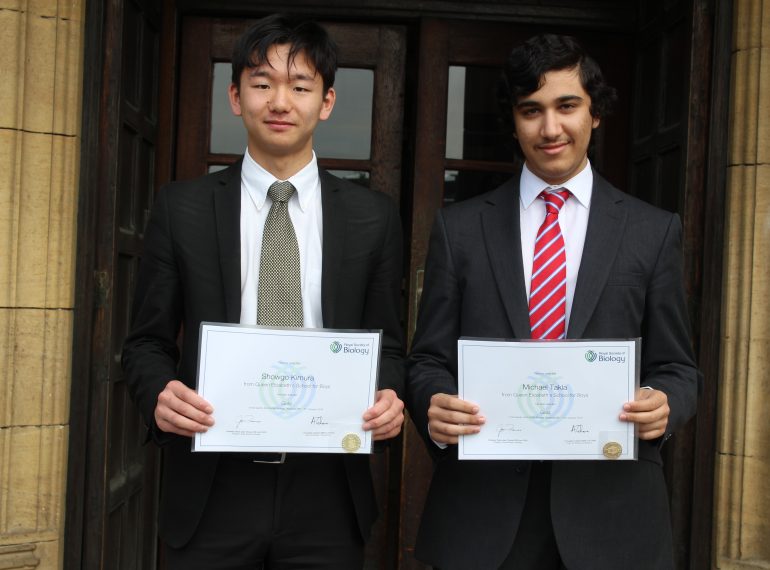
Queen Elizabeth’s School has once again excelled in the British Biology Olympiad, with two sixth-formers reaching the final round, which is open only to the top 16 young biologists in the country.
Year 13 pupils Showgo Kimura and Michael Takla were selected from Round 2 for the four-day finals, a series of practical examinations held at Warwick University.
They were among five QE boys who had qualified for Round 2, with the others being fellow sixth-formers Ilan Elango, Milan Hirji and Simon Rey. The five’s qualification placed them in the top 2 per cent of the 7,818 entrants nationwide.
Last year, QE was crowned the best-performing school in the country in the prestigious Olympiad competition, and although it will not be known until later this year if it has repeated this feat, the School is certainly in a strong position, says Biology teacher Mev Armon: it has amassed a total of 14 gold, 16 silver and 15 bronze medals.
Congratulating Showgo and Michael, Mr Armon said: “They have worked for almost two years, developing additional skills outside of the specification at lunch times. I am very proud of them and of all the boys who were awarded medals.”
After returning from Warwick, the pair reflected on the experience. Their preparation included areas such as botany, gel electrophoresis and locust dissections.
Michael said: “I enjoyed the opportunity to improve my practical skills, learning new lab techniques, and being surrounded by other people who were as interested in Biology as I am. I particularly found a practical on the induction of β–galactosidase in E. coli very interesting because it complemented prior knowledge of the regulation of lac operon expression with experimental evidence.”
Showgo added: “Unlike with School practicals, we weren’t given any extra reagent, even if we had used ours up, and this meant it was important to plan before starting. I realised this too late and had almost finished the blood sample provided on making blood smears when I needed more to complete the rest of the examination.
“Although I made other small mistakes throughout the rest of the practicals, I enjoyed all of them, especially the maggot dissection. In this practical, we had to dissect a maggot of roughly 2cm to find the dorsal vessel (the ‘heart’) and apply several drugs to investigate their effects. At first, I kept damaging the heart, but after a few attempts I improved and was able to do the dissection with ease. I didn’t expect practical exams to be as challenging and interesting as they were and I’m sure the skills I gained from them will continue to be useful as I study Natural Sciences at university.”
